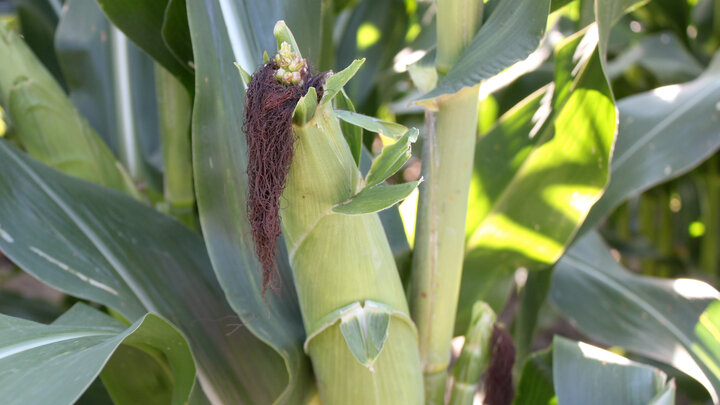Continued misconceptions about genetically modified, or GM, crops has prompted Leah Sandall, University of Nebraska–Lincoln Department of Agronomy and Horticulture Distance Education Coordinator, to co-author an article in the journal Global Food Security, titled "Risks and opportunities of GM crops: Bt maize example." The article provides an overview of the risk assessment process used to determine the potential hazards of GM crops and to help people understand how GM crops have been evaluated.
The risk assessment process has been used in medical and engineering disciplines to evaluate potential hazards or risks. Risk assessment of any new technology is an important part of the approval process and the approval of GM crops is no different.
Bacillus thuringiensis, or Bt, is a common soil bacterium with genes for several proteins to fight off certain insects. Bt maize has been genetically modified to express one or more proteins from this bacterium. The Bt protein acts as an insecticide to certain insect pests when they consume tissue from the corn plant. One current application of Bt maize is for farmers to use it to combat Fall armyworm, a damaging pest that is decimating maize crops around the world.
Using Bt maize as an example, this paper demonstrates how the scientific approach of risk assessment of GM technology is done with the same scientific rigor as in other disciplines. The safety of Bt proteins is used as an example for how risk assessment is applied to GM crops and to help people understand how GM crops have been evaluated.
The risk associated with Bt maize was determined to be low to non-existent.
The authors also reviewed potential benefits of Bt maize, emphasizing examples that may help improve food security in areas where this is a challenge. Food security is a major concern because of projected world population growth. Bt maize and other GM crops are one tool farmers can use to address production challenges and meet the increased food demand. However, in many parts of the world GM crops are not readily accepted due to concerns about safety.
Currently, only 13 countries in Africa are working on research and testing of GM crops. Only one country, South Africa, has approved making Bt maize commercially available to farmers. According to the authors, adopting GM technologies to improve yield provides significant opportunities for developing countries, where large proportions of the land area and population are dedicated to farming.
Providing information and continued education about how GM crops are evaluated can be a helpful step to improve acceptance. Continued education for the general public and policy makers focused on GM crops as another management tool for improving crop yields, reducing production challenges, and improving food safety and income for food-insecure farmers is also needed. Advocacy from producers in developed countries where the benefit of GM crops has been experienced can be an additional source of support for fellow farmers around the world.
Information about the risk assessment process might reassure policy makers, farmers and consumers of the thorough and methodical approach applied in risk assessment for GM technology so they can make informed decisions about use of GM traits in global agriculture production.
See full article at https://www.sciencedirect.com/science/article/pii/S221191241830049X#f0005




